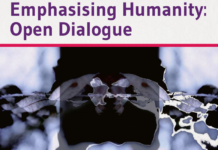October 2015 saw the completion of the first ever Peer-supported Open Dialogue (POD) training for National Health Service (NHS) staff in the UK. This exciting development paves the way for the establishment of pilot POD teams in the NHS and a large scale evaluation, comparing POD to treatment as usual.
The Open Dialogue Model
The Open Dialogue approach is a model of mental health care that involves a consistent family and social network approach. All healthcare staff receive training in family therapy and related psychological skills. The model has been adopted in a number of countries around the world, including much of Scandinavia, Germany, Italy, several states in America, and now the UK.
The Open Dialogue model revolves around ‘network meetings,’ in which the patient, together with his or her family and friends, come together with clinicians. Within these meetings, the usual hierarchy is flattened, and everyone works together to make sense of what is going on, and work out how best to help the person through their crisis. Network meetings are the only forum in which decisions are made, the patient remaining consistently at the centre of the process.
The Open Dialogue approach evolved over time in Finnish Western Lapland. Results from non-randomised trials there suggest that the Open Dialogue approach offers a substantial advantage over usual treatment for people with psychosis, despite lower rates of medication and hospitalisation compared to treatment as usual. The intensity of service input is high initially, but it is hoped that overall, resource use is substantially lower than with current services, due to many people recovering and being discharged.
Peer Support
In New York City, the Parachute Project, a further evolution has seen peer support made integral to service delivery. Peer support, in the form of Peer Support Organisers, is also to be incorporated into the NHS Open Dialogue project – hence the name Peer-supported Open Dialogue. Peer Support Organisers will participate in network meetings as equals alongside clinicians, with their expertise particularly called upon where the service user concerned lacks or has a limited social network.
UK POD Project Training
The UK NHS POD project is led by Dr Russell Razzaque, consultant psychiatrist and Associate Medical Director at North East London NHS Foundation Trust (NELFT), together with Val Jackson (www.developingopendialogue.com) and Mark Hopfenbeck from Gjøvik University in Norway.
Over the past year, members of teams from four NHS trusts (NELFT, North Essex, Nottinghamshire, and Kent and Medway) attended four residential training weeks, jointly organised by NELFT and Gjøvik University. The training combines studying the framework of the POD model together with experiential learning of skills, with self-work, such as mindfulness, central to an ongoing personal development.
The completion of the courses and written assignments by trainees will lead to the award of a Foundation Diploma in Peer-supported Open Dialogue, and the opportunity to become a member of the recently established Academic Institute of Peer-supported Open Dialogue, which will regulate practice. These accredited clinicians will form pilot POD teams in their NHS trusts.
A second wave of training will begin in January 2016, with further staff from some of the trusts already represented, as well as staff from newly involved trusts.
UK POD Project Evaluation
A national multi-centre randomised control trial, led by University College London in collaboration with the King’s College Clinical Trials Unit (London), is planned to start in 2016/17. This will compare POD (delivered by the pilot teams) to ‘treatment as usual’ (within the same trusts), in terms of recovery outcomes, hospitalisation, medication use, and wider service use.
The aim is to increase the evidence base for POD, and, should the results support this, to enable more widespread practice of POD across NHS services over time.
You can stay updated with the progress of the UK POD project by subscribing to the POD Bulletin at www.podbulletin.com.
Note: Open Dialogue in the UK
In the UK, we are lucky enough to have two large scale Open Dialogue projects. In addition to the NHS POD project, Nick Putman also runs Open Dialogue UK, working to promote the Open Dialogue approach in the UK. This organisation offers training courses, and will be holding a conference in London in February 2016, featuring leading international figures in Open Dialogue, including Russell Razzaque and Val Jackson from the UK Peer-supported Open Dialogue project (http://opendialogueapproach.co.uk/).















Excellent news, Tom!
An alternative to “you have a brain disease and need to take neuroleptics for life” is desperately needed. This type of program assumes the possibility of real recovery and is ahead of conventional “treatment” from the get-go due to that hopeful placebo-like effect.
Two questions:
1) Will neuroleptics be mandatory or will their use be limited/minimized/kept short-term wherever possible? It can be predicted now that if heavy neuroleptics use long-term is the norm, the program will fail.
2) Regarding “recovery outcomes”, will data be taken only from professionals’ judgment of how clients are doing, or will service users actually rate their subjective wellbeing (in both OD and treatment as usual programs) so that their voice is heard?
Lastly, I think the the phrase “a substantial advantage over usual treatment for people with psychosis, despite lower rates of medication” might be more accurately phrased as, “a substantial advantage over usual treatment for people with psychosis, which is probaly partly due to lower rates of medication.” Then again, sometimes the likely truth is too threatening to say.
Report comment
Very important questions, I’d also like to know the answer.
Report comment
Agreed. I also am very inspired about the POD model of care.
I am a Retired Family Physician from Canada who happened to experience a Psychotic Episode in 2012, fairly late in my life. I felt it was more of a Spiritual Emergency. There was no room for my views within the Traditional Biomedical Model of care that I received. Each of 3 involuntary hospitalizations have earned a Story that I share on my Blog. A dark chapter in my life but full of growth and learning. As you can imagine, I have thought a lot about the Mental Healthcare System.
Just last month I wrote in my style about the wonderful POD model. As a Doctor, as a Patient, also a Medium, this Model is an Epic Upgrade. Compassionate and Heart Open. Valuing a positive therapeutic alliance. Without this, it cannot really be called care but control and authority.
http://disabledangel.ca/?p=4161
Thank you for writing!
Report comment
Hi, nice website.
I read the front page. Can you tell me where you got the statistic that Open Dialogue’s 75% of people working/studying within 2 years was 10x the rate of recovery in a British biomedical model study? Which British study or treatment program was this, that did so poorly?
I believe this is probably close to true. Just curious what your source was.
Please reply to this or let me know at bpdtransformation (at) gmail (dot) com
This is information that could be useful to me in encouraging a family member about what’s possible in nonconventional care.
Report comment
BPD,
I live in the UK and in my experience the UK NHS has a strict policy on not ‘allowing’ people to recover, even if they have been recovered for many years.
Non psychotropic drug recovery to the NHS is probably the worst thing a person could ever do.
Report comment
I like in the UK and ‘recovery’ is absolutely rammed at people within the NHS. Yes like all western systems it’s medically orientated despite stating it’s ‘recovery orientated’ but it absolutely wants people to ‘recover’ (with their diagnosis/medication/recovery “college” stint, or go away. Services are short term and time limited.
Report comment
*live (not like)
Report comment
Your country is in serious dire crises.
https://www.rt.com/uk/250501-austerity-toxic-mental-health/
Report comment
You spell out very good concepts and ideas on your webpage. The longer people continue to fight psychiatry the longer it will take to bring about the correct support systems that people so urgently and desperately need, all over the world. Simply put, psychiatry must get out of the way.
You say you’re a medium. Such a thing is not recognized by psychiatry (they deny Spirit). In their eyes, they would call your claim of mediumship psychosis or schizophrenia. Psyche is not a disease of the brain or mind but to psychiatry, it is. Psyche, by definition, means Spirit.
I’m like you – a medium, of sorts. It is much more than that, though. I have absolute evidence and proof of telepathy, prophecy, precognition, visions and more – but the world refuses to hear me. My evidence and proof belong to the world and the people of the world NEED my evidence and proof. There are too many obstacles (brainwash, mind control, fear, unwillingness, stubbornness, jealousy and more) and so the world remains happy to be in the dark.
There is another model of help – support and assistance – in the world and something I deeply appreciate and admire,
“In 2010 the Holy Spirit directed the ministry to purchase a home which would house, “Women of Hope.” This outreach ministry directed by David and Connie Herring offers a Christ-centered 15 month program promoting healing, deliverance, wholeness, independence, structure and family restoration for women.” http://www.voe.org/about-us/about-voe/
Deliverance. Wholeness. Restoration.
Psychiatry and the mental system do not use those words. Open Dialogue is mostly a crisis response system, which is good, but it is not fit or qualified to deal with matters of the soul, and Spirit. In other words, Open Dialogue is only one aspect – one avenue – of life crisis and life response.
Humanity’s great awakening has us – some of us – knowing and understanding more and better about the true nature of psyche, of Spirit. But the SOUL, of which, psychiatry is NOT the diagnostician, nor the doctor or judge, despite their claim to be, is something humanity has yet to fully realize.
Spirituality is nothing without Scripture, and in humanity’s further awakening, it will become more apparent, certain and clear that only Scripture has the answers, and only Scripture knows the way.
Report comment
In podbulletin of peer supported OD they disscuss lower rates pay for the users involved. I would argue that it is dishonest. Peers pay their emotional wellbeing working in that model. But maybe team work will help to overcome their tiredness. But again – peers are to be not equal from the start. That means teamwork will not help. That’s what i think from my personal experience. Finnish model is based on morality first thing.
Report comment
Reduced medication/admissions/symptoms/use of services/satisfaction with care/social network size & quality will form part of the outcomes evaluation along with the Process of Recovery Questionnaire. The questionnaire needs rethinking because it’s way too loaded and overlooks the fact that ‘recovery’ is not a concept everyone subscribes to.
http://www.tandfonline.com/doi/pdf/10.1080/17522430903553495
Report comment
This questionnaire is loaded with societal expectations, I agree with it.
I could not hep but LOL at ” I can weigh up the pros and cons of psychiatric treatment”.
Report comment
‘societal expectations’? No not really, it’s supposed to be evaluating people’s experience of the service, not telling them what their outcomes ‘should’ be
Report comment
it’s also important to evaluate OD within different policy contexts in different countries which will impact on outcomes because the UK is not like for like with Finland in terms of education/housing/employment/welfare, social policies also contribute to outcomes.
Report comment
That’s quite interesting because Finland would have one emphasis and this mightn’t suit a different cultural setting, for example I couldn’t see myself confiding in my family ( – even though they are good people).
But if it works, it works and would be able to adapt to the different social culture.
Report comment
that needs to evaluated along different policy contexts
Report comment
Completely agree 9, my country is in dire crisis because of neoliberal policies which are literally killing citizens and pushing people into a mental health system which is derailing. Given we have a housing crisis, a punitive welfare system (both in and out of work) which has the power to leave people destitute/homeless, even more reason why we have to pay attention to the social causes of mental distress and policies which further entrench them.
Report comment
Comment removed.
Report comment
Britain First is a vile far-right nationalist group formed by former members of the British National Party, they are racist, xenophobic, anti-Islam, anti-refugee, anti everything hateful, but they are a minority and no not represent the majority of british people, and don’t have a single seat in parliament. They are not the major problem in the UK.
Report comment
Hi Tom,
Thank you for another inspiring article on the recent developments of Open Dialogue in the United Kingdom. My name is Ute and I work with Nick (Putnam) in the partner project Open Dialogue UK.
We are glad to announce the next international Open Dialogue conference in London on 2 February 2016 – with a special focus on new ways on working together, as per example, by including peers (team members with lived experience of mental distress).
Please spread the work to all who support Open Dialogical Approaches internationally and are interested in moving it towards more openness and democracy:
TWO WEEKS LEFT TO BOOK AT EARLY BIRD RATE FOR OPEN DIALOGUE UK 2016 CONFERENCE – SERVICE USER FEE £20.00 UNTIL 30 NOVEMBER
Our 2016 conference takes place on 2 February in London and brings together many of the leading developers of Open Dialogue internationally. Keynote speakers will be Jaakko Seikkula, one of the founders of the approach and Volkmar Aderhold and Petra Hohn, who have been leading the development of the approach in Germany and also in the Parachute Project in NYC. We are delighted to also welcome three key members of the Parachute Project team from New York, as well as members of the Peer supported Open Dialogue project in the UK.
The conference includes a special focus on peer workers in PARACHUTE NYC and in the peer supported Open Dialogue in the NHS project. Peer worker Corrine Hendy, founding member of the Nottingham Open Dialogue group, will present on her experience as peer in the training for the NHS pilot. Experienced service user researcher Dr Sarah Carr, who will be a panellist at the conference, now also supports the development of the pilot trial for peer supported Open Dialogue in the NHS. It is a special pleasure that Leslie Nelson, a peer worker in the PARACHUTE NYC project, will speak about the peer experience in the PARACHUTE teams.
We are delighted that Jacqui Dillon and Rachel Waddingham, two internationally acknowledged trainers and speakers from the Hearing Voices Network England, will be panellists on the day of the conference.
As well as addressing the key themes of openness and democracy, the conference will provide a unique opportunity to get an overview of the current state of development relating to Open Dialogue nationally and internationally. There will also be a panel of leading clinicians/experts from a variety of backgrounds in the UK who will be reflecting on the presentations, including James Davies, Peter Kinderman, Anne Cooke, Sami Timimi and Julie Repper.
We have a range of price points in the hope that everyone who wishes to attend will be able to, including group discounts and early bird rates:
* Organisation Rate: £110, £125
* Organisation Group Rate**: £99, £112.50*
* Independent Practitioner Rate: £75, £85*
* Student/Carer Rate: £30, £35*
* Service User/Benefits Rate: £20, £25*
Early Bird (until 30 Nov 2015)
* Full Rate (from 1 Dec 2015)
** Group rates for 5 or more people
For further details of the conference and to book places please visit our website by clicking here http://opendialogueapproach.co.uk/2016-conference/
We would love to welcome you in London next February!
With best wishes,
Ute
Report comment